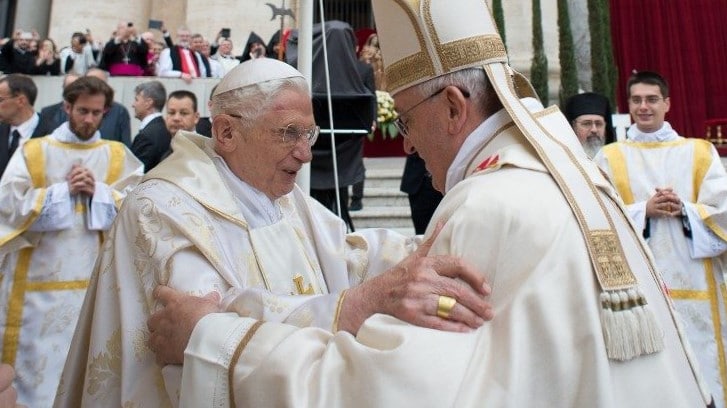Pope Francis wrote the Introduction to the book “The True Europe, Identity and Mission,” by Joseph Ratzinger-Benedict XVI. It is the third volume of the collection of “Selected Texts,” chosen and translated by Pierluca Azzaro, Editor of the Pope Emeritus’ Complete Works. In the text, published on September 12, 2021, by the Italian newspaper Corriere della Sera, the Holy Father points out that Europe’s rebirth depends on respect for human life.
Here is a translation of the full introductory text written by the Holy Father and offered by “Vatican News.”
* * *
I am pleased to present this volume, which brings together a selection of texts of Joseph Ratzinger/Benedict XVI on Europe, published on the occasion of the 50th anniversary of diplomatic relations between the Holy See and the European Union.
With the clarity, immediate accessibility, and profundity that characterize them, the Pope Emeritus sketches here magnificently the “idea of Europe” that, undoubtedly, inspired its Founding Fathers and is at the heart of its grandeur, and whose definitive obfuscation would lead to its global and irreversible decadence.
Because this is what we are shown, perhaps better than others, by the man who took the name Benedict, also to recall Europe its roots — at the base of Europe, of its creativity, its healthy prosperity and, above all, of its humanity, is the humanism of the Incarnation. Joseph Ratzinger writes that the “figure of Jesus Christ is at the center of European history and is the foundation of true humanism, of a new humanity.
If God has made Himself man, man acquires a totally new dignity. If, on the contrary, man is no more than the product of a random evolution, then his humanity is a fluke, so that at some moment it will be possible to sacrifice man for seemingly higher ends.
However, if God has created and wanted every man individually, things are completely different. And if God Himself made Himself man, if He also suffered for man, then man shares in God’s own dignity. One who is mistaken about what man is, attacks God Himself.”
Beyond the many words and high-sounding proclamations, being lost increasingly in today’s Europe is the idea of respect for all human life, beginning from the loss of the awareness of his sacred character, that is, from the darkening of the consciousness that we are God’s creatures.
In the course of the years, Benedict XVI has not been afraid to denounce, with great courage and farsightedness, the many manifestations of this dramatic rejection of the idea of creation, up to the current and ultimate consequences, described in an absolutely clear and convincing way in the text I introduce.
Although the book is permeated with great realism, it does not remain in pessimism and sadness, on the contrary: ”A reason for my hope consists in the fact of desiring God, the search for God is profoundly inscribed in every human soul and it cannot disappear,” he writes.
One can certainly forget God for a time, leave Him aside, be concerned with other things, but God never disappears. What Saint Augustine says is simply true, that we humans are restless until we find God. This restlessness exists also today. It is the hope that man will always set out, including today, on the way to this God.”
Thus, by revealing the secret of his joy in these difficult times, Benedict XVI also shows us the way for Europe’s rebirth.
© Libreria Editrice Vatican










